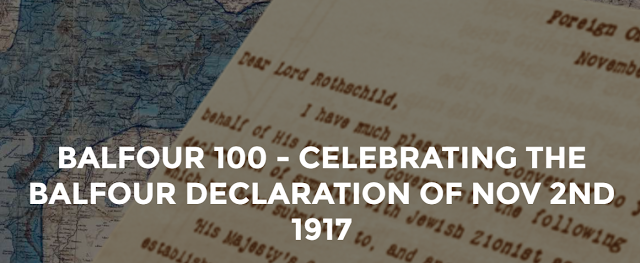
A group of Christian ministry leaders in the UK, under the name Balfour100.org, are planning events to celebrate the centennial of the Balfour Declaration next year.
Here is their take on the history of the document:
Five hundred years ago the Reformation led to the Bible being translated into English and read by the common man. This led to a greater interest, particularly among Puritans, in the Hebrew text of the Old Testament. They were able to read for themselves the prophetic passages speaking of the eventual return of Israel to her biblical promised land. By the 17th Century there was a growing awareness among British evangelicals generally that the Bible prophesied the return of the people of Israel to their historic Promised Land.
Later, in the 19th Century, many well-known preachers like Bishop J.C.Ryle and Baptist preacher Charles Spurgeon taught on the restoration of the Jews to their land. Bible-believing Christians (such as William Wilberforce and Lord Shaftesbury who were also enthusiastic restorationaists) had a huge influence on the governments of the time. A belief in the restoration of the Jewish people to Israel has been described as the “default position” for evangelicals in the 19th and early 20th centuries. Sadly, that is not the case today.
Ryle, Spurgeon and others were influential in presenting the case for the return of the Jews. As Bible students they longed to see the return of Jesus Christ. Before that could happen, the Jews had to be back in their own Land (Israel). They understood this from prophetic passages in the Old Testament foretelling the appearance of Messiah in Jerusalem to a restored Jewish people. This then became the central focus of their prayer and political action but seemed impossible while the ancient Land of Israel was under Muslim Turkish control and the Jewish people scattered for 1,900 years.
In 1896 Austrian Jewish journalist Theodor Herzl, incensed at the anti-semitism he saw around him (especially the notorious Dreyfus affair), wrote ‘Der Judenstaat’ on the need to re-establish the Jewish State as the only viable long-term solution for the survival of the Jewish people.
As Herzl began the movement that became known as “Zionism” he became friends with an evangelical Christian minister, Rev William Hechler. Hechler’s high level contacts as a diplomatic chaplain in Vienna enabled Herzl to gain valuable patronage for Zionsim and helped to envision influential leaders, including the Kaiser of Germany.
Historians have noted that if Herzl had not had Hechler’s support and encouragement to continue his work, Zionism might never have been birthed as a political movement. Hechler, a spiritual heir of the likes of Ryle and Spurgeon, was one of the first “Christian Zionists”.
As the 19th Century became the 20th, another partnership between Jew and gentile was developing that was key to the furtherance of the dream of a revived Jewish homeland.
Chaim Weizmann, born in 1874, was one of fifteen children born to a Jewish couple in Belarus. He studied biochemistry in Germany and moved to Manchester in 1904. Becoming a leading bio-chemist in the years that followed, Weizmann also became a leader in the Zionist movement in Britain.During World War 1 he developed an important chemical ingredient for gunpowder, which brought him to the attention of the British Government and particularly Lord Balfour, with whom he had already become friends.
Born in Scotland, Arthur Balfour became MP for Manchester East (where he first met Weizmann) in 1885, and was Prime Minister from 1902-05. In 1917, when the Balfour Declaration was made, he was Foreign Secretary
This was the partnership that eventually led to the letter known to this day as the ‘Balfour Declaration’ (Balfour was the signatory). A friendship developed, during which Weizmann, the ardent Zionist, persuaded Balfour, an evangelical Christian in favour of Jewish restoration, of the case for a homeland for the Jewish people in what was then “Palestine.”
Britain’s strategic needs, burgeoning alliances with Arab leaders and the clear justice of the zionists’ dreams coalesced on 31st October 1917, when Britain’s war cabinet (most of whom were also evangelical Christians) agreed the final wording of a letter to Lord Rothschild and the Zionist Federation; a letter which became known as “The Balfour Declaration”.
Another event took place on 31st October 1917, which was key to the intentions expressed in the Declaration. General Allenby won a key battle against the Turks and Germans for the desert town of Beersheva. Without a plan for the future, the victory at Beersheva would have been just another battle in a long and bloody war, a footnote in history. The two events, occurring at the same time yet thousands of miles apart, was a sure sign that this was God bringing His plan for the Jewish people’s restoration to their land closer to its fulfilment.
Bye itself, the Balfour Declaration carried little legal weight. It was simply an expression of intent by the British government of the day. Five years later however, in the aftermath of World War One, its intent and most of its very wording were incorporated into international law in the San Remo Declaration and the British Mandate for Palestine.
Christians and biblical teaching were instrumental in the events leading to the Declaration, going right back to the Reformation. This gives Christians who love the Jewish people and the state of Israel a desire to celebrate the centenary of this short but vital document along with the Jewish community in November 2017.
We have lots of ideas, but we need more resources to be even more effective. Please donate today to help get the message out and to help defend Israel.

Leave a Reply